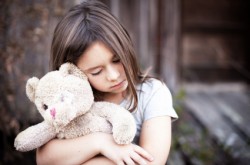Treatment for Childhood Clinical Depression
According to a Duke University report, 1 in every 20 children suffers from a childhood clinical depression disorder. As children have limited communication skills compared to adults, many cases of childhood depression go unnoticed both within the home and at school. Knowing what types of symptoms to look for can go a long way towards getting children the type of treatment they need.
Standard treatments for childhood clinical depression may include medications, psychotherapy or a combination of the two. As with adult cases of major depression, the severity of the symptoms determines what type of treatment will work best for each child.
Childhood Clinical Depression Components
Depression disorders in general result when a person continues to internalize difficult thoughts, experiences and emotions rather than expressing them in a healthy manner or acting out in destructive ways. Internalized emotions tend to “come out” in different ways, some through physical symptoms others through behavioral symptoms.

There are treatments that can help if your child is suffering from depression!
Not surprisingly, children in different age groups, such as pre-puberty versus puberty versus late adolescence tend to express depression symptoms in different ways.
- Symptoms of irritability are easier to spot in younger children than in adolescents
- Symptoms of lethargy or low energy are easier to spot in adolescents than in younger children
- Adolescents are less likely to display outward feelings of sadness than children
Regardless of the age of the child, symptoms of childhood clinical depression will disrupt areas within a child’s life. Whether it be poor school performance, conduct disorders or substance abuse problems, depression symptoms can cause considerable problems in a child or adolescent’s daily life.
Treatment for childhood clinical depression requires a comprehensive understanding of a child’s psychological history, identification of depression symptoms and a working relationship between family and school officials to address any ongoing issues or problems.
Psychotherapy vs. Medication Treatments
As children and adolescents are still in developmental stages, both physically and psychologically, treatments for clinical childhood depression tend to favor psychotherapy over medication treatment approaches. Medication treatments, while effective can potentially have any number of unknown effects once a child reaches adulthood. Nonetheless, as with adult depression symptoms, selective-serotonin reuptake inhibitors or SSRIs work well in treating symptoms associated with clinical childhood depression.
Cognitive-behavioral therapy or CBT is the most commonly used psychotherapy approach for treating childhood depression. CBT approaches focus on reworking the underlying belief systems that drive the emotional feelings and symptoms of depression in children.
Combined Treatment Effects
Much like major depression disorders in adults, childhood clinical depression exists as a chronic, mental condition. For children, effectively treating depression symptoms at the outset can greatly reduce the likelihood of recurring depression episodes in later years. For this reason, many clinicians combine both medication and psychotherapy treatment approaches when treating clinical childhood depression disorders.
Studies conducted by Duke University researchers show 60 percent of children receiving both types of treatment show ongoing symptom improvement while children receiving only one form of treatment show a 50 percent relapse rate. In effect, by combining both treatment approaches, symptoms improve for longer periods of time, which works to weaken the overall severity of the disorder in later years.





